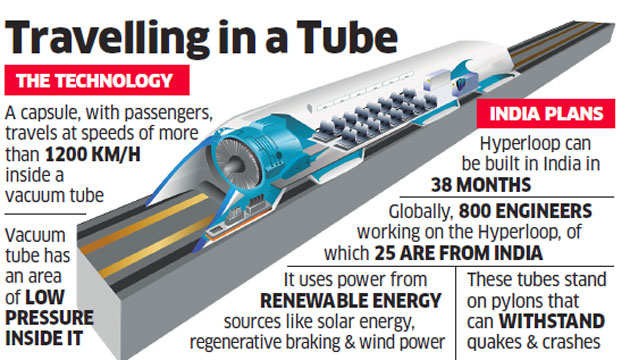Hyperloop Project

- 18 Mar 2025
In News:
India is moving closer to realizing ultra-high-speed transportation with the development of indigenous Hyperloop technology. The Ministry of Railways, has announced that Integral Coach Factory (ICF), Chennai will develop the electronics component for the country’s Hyperloop initiative. This decision follows promising test results at IIT Madras, which hosts the longest Hyperloop testing facility in Asia.
What is Hyperloop?
Hyperloop is a next-generation, ultra-fast transportation system that combines magnetic levitation (maglev) and near-vacuum tubes to enable passenger pods to travel at speeds up to 1,220 km/h. It was first proposed by Elon Musk in 2013 through the Hyperloop Alpha white paper and has since evolved into a global open-source research initiative.
Working Mechanism:
- Low-pressure tubes drastically reduce air resistance.
- Magnetic levitation allows pods to float without touching surfaces, minimizing friction.
- Electromagnetic propulsion moves pods forward efficiently.
Key Features:
- Highly energy-efficient and sustainable, with low emissions.
- Can surpass air travel speeds on shorter routes.
- Reduces road congestion, travel time, and noise pollution.
India’s Hyperloop Developments:
- Institutions Involved:
- IIT Madras – Developed the 410-meter test facility.
- Avishkar Hyperloop Team – Leading design and innovation.
- ICF Chennai – To develop electronics and technical components.
- Government Support:
- The Railway Ministry has provided financial and technical support.
- The testing system uses fully indigenous technology.
Challenges Ahead:
Despite its promise, Hyperloop faces significant hurdles:
- High infrastructure costs.
- Technical challenges in maintaining vacuum conditions.
- Safety concerns due to the high speed and pressure system.
